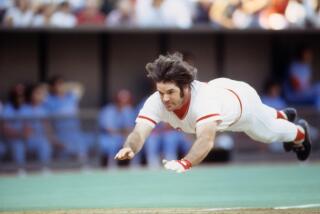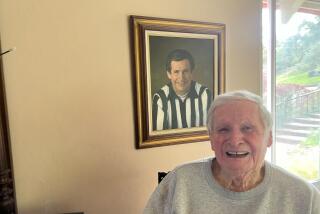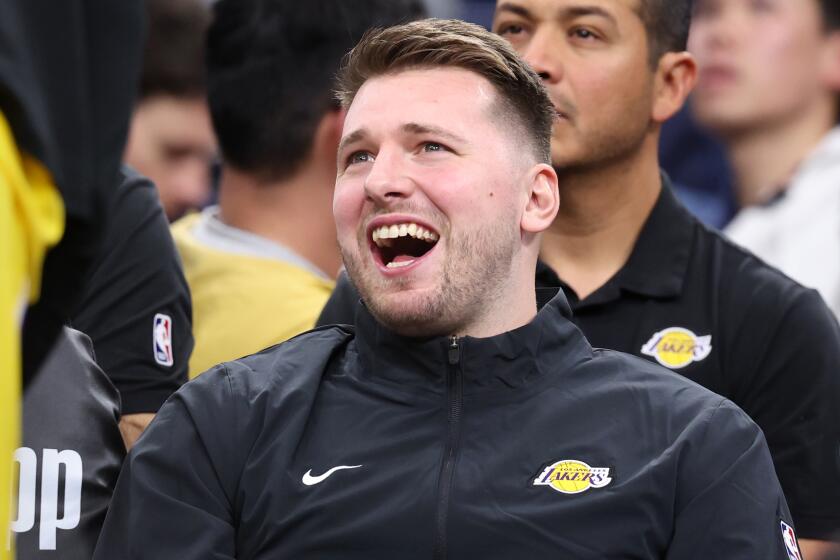Art Rooney of Steelers Dead at 87 : Beloved Owner Dies of Stroke Complications
- Share via
PITTSBURGH — Art Rooney Sr., the cigar-chomping father figure behind the Pittsburgh Steelers and one of the most beloved men in American professional sports, died Thursday of complications from a stroke. He was 87.
“He will be remembered by all he touched for his innate warmth, gentleness, compassion and charity,” National Football League Commissioner Pete Rozelle said of the man often called The Chief.
Rooney, whose Steelers stumbled through four decades of mediocrity before they became four-time Super Bowl champions in the 1970s, was hospitalized with a stroke Aug. 17 after becoming ill at the Steelers’ offices. He had been in a coma since Monday.
Dr. Theodore Gelet, Rooney’s personal physician, said doctors gradually removed Rooney from a respirator after it was clear that his body functions were failing and he had no brain activity. He said medication was not able to maintain Rooney’s blood pressure and the respirator was breathing for him.
“At 7:45 a.m., The Chief . . . passed away in his sleep with his family at his bedside,” Gelet said. Rooney had five sons, including Steeler President Dan Rooney.
Funeral services will be at 11 a.m., EDT, Saturday at St. Peter’s Church on Pittsburgh’s North Side, where Rooney lived in the same modest home for most of his life.
Rozelle said Rooney’s “calm, selfless counsel” made him one of the league’s most dominant figures, respected by his fellow owners for his insight and professionalism for more than five decades.
Rooney was perhaps the most visible man in Pittsburgh, and not just because of the fanatic interest in his football team, the NFL’s fifth-oldest franchise.
“Very rarely can the word legend be properly attached to someone, but it is certainly appropriate in describing Art Rooney Sr.,” said Carl Barger, Pittsburgh Pirates president.
A devout Roman Catholic, Rooney attended thousands of wakes and funerals--some for people he barely knew--and shook hundreds of hands a day. He treated custodians and chairmen of the board with equal respect and once said: “How would I like to be remembered after I die? I’d like to be remembered as a good guy.”
Rooney, who loved horse racing almost as much as he did football, bought the Steelers in 1932 with $2,500 he won betting, then watched them struggle for 40 seasons before becoming the NFL’s dominant team of the 1970s. Once ridiculed as being the “Same Old Steelers,” they are the only team to win four Super Bowls.
Rooney was a shrewd entrepreneur and race-track operator who earned millions of dollars before turning over his sports empire to his sons in the late 1960s. Despite his wealth, Rooney never left the decaying neighborhood where he grew up.
And Rooney’s daily rituals--Mass at a neighborhood church, five-minute walk to Three Rivers Stadium, cigars and chats with reporters--rarely changed.
“I’m a Pittsburgh guy,” Rooney would say.
Even after Rooney turned over Steeler operations to his sons, Dan and Art Jr., he refused to move away from the Victorian-style home he and his wife, Kathleen, bought in the 1930s for $5,000.
“Why should I move?” he asked. “I can be at the stadium in five minutes. I can go there any time I want. What should I do? Just sit around? If there’s not a game, I’ll just go down to the stadium and talk to the grounds crew.”
Born Jan. 26, 1901, in Coultersville, Pa., Rooney was one of eight children born to a saloon keeper who moved his family to Pittsburgh in 1903. As a youngster, he played on the same ground where Three Rivers Stadium stands.
His racing holdings once included Yonkers Raceway in New York, a dog track in Florida, the William Penn Racing Assn. at Liberty Bell near Philadelphia and the Green Mountain Race Track in Vermont.
Even after divesting himself of his racing interests, Rooney kept a private box at Churchill Downs and attended his 63rd consecutive Kentucky Derby last May.
He even blamed his love of racing for the Steelers’ early football failures: “I didn’t give it the time. I was always going to the race track.”
His Steelers not only lost on the field, but at the gate.
“Some people think there was always a lot of money associated with pro football, but there wasn’t,” Rooney said. “When I first bought the team, pro football wasn’t a hop, skip and a jump from semipro football. Maybe just a hop.
“The thrill was not only winning or losing, but making the payroll.”
Nevertheless, Rooney took a gamble on Byron (Whizzer) White, a spectacular rusher who would later become a Supreme Court justice, by paying him $15,300--an unheard-of salary during the 1930s.
Still, his Steelers didn’t win big.
For years, Rooney was content to let his coaches--some of whom were his race-track companions--to run his teams. He said that might have been his biggest mistake, because: “I am positively sure that had I run my ballclub like some of the other owners ran theirs, we would have won championship after championship. I knew football, knew football material, knew what was what.”
It wasn’t until after 1969, a 1-13 season, that the Steelers’ luck changed. Dan Rooney hired away Baltimore Colts assistant coach Chuck Noll to lead the club. Then, in the first round of the draft, the Steelers took a promising but little-known defensive lineman from North Texas State named Joe Greene.
The Steelers’ first-round pick in 1970 was a quarterback named Terry Bradshaw, who threw just 6 touchdown passes and 24 interceptions that season.
“When I was getting a lot of heat early on, he was the one who told me, ‘You’re going to be great. Don’t worry,’ ” Bradshaw said.
In 1972, Bradshaw threw one the most famous passes in pro football history to Franco Harris in the Steelers’ first playoff game. Known as the “Immaculate Reception,” Bradshaw’s throw-it-and-pray heave ricocheted off two players into the hands of the rookie running back for a 60-yard touchdown and a last-minute, 13-7 victory over the Oakland Raiders.
Rooney missed the play because he was already on his way to the locker room to console his players. But Harris’ catch changed the Steelers’ image and Rooney’s football fortunes.
The Steelers went on to win Super Bowls in 1974, ‘75, ’78 and ’79 and were hailed as “The Team of the Decade.”
Rooney said his proudest moment was accepting his first NFL championship trophy from Rozelle after a 16-6 victory over the Minnesota Vikings. Each of the Steelers dedicated that win to Rooney.
Said Lynn Swann, former Steeler wide receiver: “I think everybody had a tear in his eye when they saw The Chief with that trophy. . . . We all loved him.”
Kathleen, Rooney’s wife of 51 years, died Nov. 28, 1982.
He is survived by his sons: Dan; Art Jr., a vice president and the team’s former scouting director; and Pat, Tim and John, who are involved in various family-related businesses.
More to Read
Go beyond the scoreboard
Get the latest on L.A.'s teams in the daily Sports Report newsletter.
You may occasionally receive promotional content from the Los Angeles Times.










